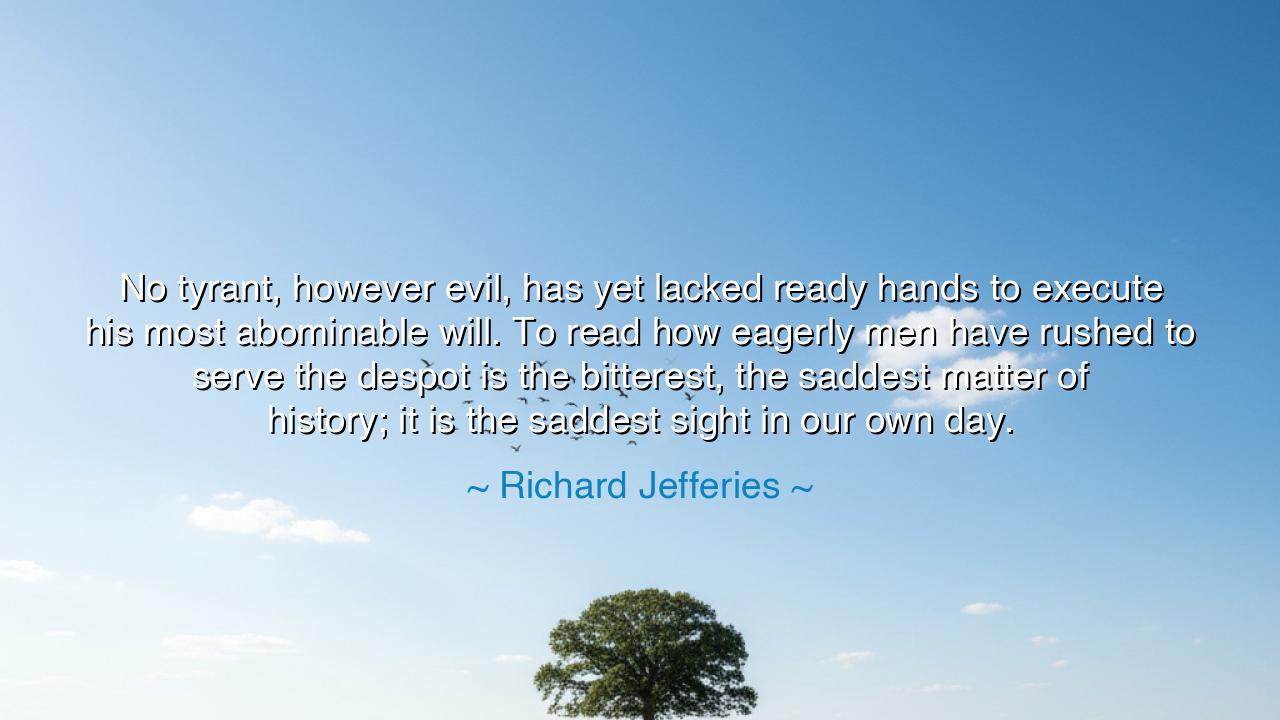
No tyrant, however evil, has yet lacked ready hands to execute
No tyrant, however evil, has yet lacked ready hands to execute his most abominable will. To read how eagerly men have rushed to serve the despot is the bitterest, the saddest matter of history; it is the saddest sight in our own day.






“No tyrant, however evil, has yet lacked ready hands to execute his most abominable will. To read how eagerly men have rushed to serve the despot is the bitterest, the saddest matter of history; it is the saddest sight in our own day.” – Richard Jefferies
In this grave and luminous reflection, Richard Jefferies, a man of deep moral vision, lifts a mirror to one of the darkest truths of human nature. He declares that tyranny does not rise by the hand of one man alone, but by the multitude who choose obedience over conscience, convenience over courage. The tyrant may conceive the evil, but it is the willing servant who gives it life. Jefferies does not only mourn the cruelty of despots; he mourns the weakness of humankind — our readiness to kneel when we should stand, to follow when we should resist. In his words lies both lament and warning: that the corruption of the few is made possible only by the compliance of the many.
From the dawn of civilizations, this tragedy has repeated itself. In the courts of emperors, in the temples of kings, in the offices of modern power, the same pattern unfolds. The tyrant — bold, cruel, or cunning — demands injustice, and men, fearful or ambitious, carry it out. The whip needs a hand to raise it; the prison needs a guard to lock it; the law needs a voice to twist it. And there are always those ready to serve. Jefferies sees in this the most terrible paradox: that evil does not survive because it is strong, but because good men fail to resist. The saddest pages of history, he tells us, are not written by monsters, but by ordinary people who surrendered their will.
Consider the tale of Nazi Germany, when millions turned their eyes away as unspeakable horrors unfolded. The tyrant, Adolf Hitler, could not have ruled alone; it was the countless functionaries, soldiers, clerks, and citizens — some zealous, others silent — who became the machinery of destruction. Each justified their role: “I was only following orders.” But each act of obedience became a brick in the edifice of atrocity. Jefferies’ insight pierces directly into such hearts — for the tragedy of tyranny is not only in the cruelty of the ruler, but in the submission of the ruled. When humanity forgets its moral voice, the despot finds endless hands eager to serve his will.
Yet Jefferies speaks not only to the past but to our own day, as he himself wrote. For the spirit of tyranny is not always crowned or uniformed; it may wear the mask of ideology, convenience, or authority. Even now, in offices, governments, and nations, people avert their eyes from injustice because they fear standing alone. The tyrant need not raise a sword — he need only whisper fear into hearts, and they will silence themselves. The eagerness to serve the despot still haunts our world, because cowardice and conformity are easier than courage. This, Jefferies calls the saddest sight — that humankind, after so many centuries of suffering, still has not learned that to obey the wicked is to join them.
But we are not condemned to this fate. History also tells of those rare souls who refused to lend their hands to evil. When the Roman Senate trembled before Nero, one man, Thrasea Paetus, stood silent in defiance and paid with his life. When the world bowed to Hitler, Sophie Scholl, a young student, scattered leaflets of truth in the heart of Munich and was executed for it. These are the luminous exceptions that prove Jefferies’ sorrowful rule — that in every age, the few who resist become the conscience of the many. They remind us that moral strength is not born from numbers, but from integrity.
Jefferies’ words call upon us to awaken — to look upon the world and ask not, “What will others do?” but “What will I do when injustice calls for my silence?” For the ready hand of history need not always belong to another. Each person must examine their heart: when do I obey what I know is wrong? When do I excuse cruelty, or allow lies to stand unchallenged? To resist tyranny begins not with rebellion in the streets, but with truth in the soul.
So, let this be the teaching drawn from Jefferies’ sorrow: never lend your strength to injustice, however small the act may seem. The tyrant cannot rise without builders; refuse to be one. The despot cannot command without listeners; close your ears. The corrupt cannot thrive without applause; withdraw your praise. Be the one who stands, even when others kneel. For though the tyrant may have ready hands, he trembles before a single heart that will not serve him.
And thus remember, O child of the future: the fight against tyranny is not fought once in the halls of kings, but daily, within the chambers of every human heart. To resist is the burden of freedom; to obey blindly is the seed of slavery. Stand firm, and let no despot — great or small — ever find in you a willing hand to do his will.






AAdministratorAdministrator
Welcome, honored guests. Please leave a comment, we will respond soon